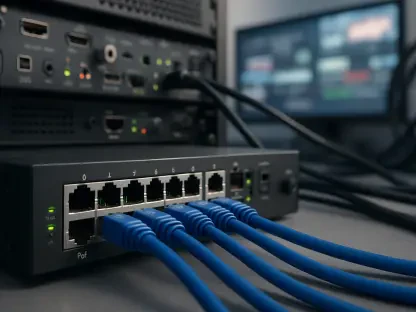The transformative power of private 5G networks combined with In-Factor Profile Provisioning (IFPP) represents a pivotal shift in enhancing connectivity within industrial operations. These cutting-edge technologies are redefining how industries like manufacturing, logistics, and utilities implement secure, reliable, and efficient communication infrastructure. By providing dedicated, on-site cellular networks, private 5G offers ultra-low latency and high throughput, critical features for applications demanding rigorous control like autonomous robotics and real-time monitoring. Concurrently, IFPP facilitates seamless device onboarding and management by embedding digital credentials into devices early in the production process. This innovative approach simplifies the integration of diverse devices within the industrial ecosystem, ensuring zero-touch onboarding and reducing the need for manual intervention. As industries strive for greater operational efficiency and security, the combined capabilities of private 5G and IFPP are setting the stage for a new era of autonomous industrial IoT operations that promise to drive productivity and innovation.
Defining the Role of Private 5G Networks
Private 5G networks are gaining traction as optimal solutions for industries seeking robust and secure connectivity tailored to their specific needs. Unlike traditional Wi-Fi and LTE networks, which can suffer from interference and unpredictability, private 5G networks provide a dedicated cellular infrastructure that ensures deterministic connectivity and reliability. This infrastructure is crucial—particularly in environments where real-time data processing and seamless communication between machines and systems are essential. Moreover, private 5G networks excel in their ability to support high-density device deployments, which are common in industrial settings, without compromising on performance or security.
A significant advantage of private 5G networks comes from their ability to leverage network slicing. This technology allows specific portions of the network to be allocated to certain tasks or applications, thus optimizing resource usage and enhancing operational precision. Whether for supporting edge computing, facilitating task-focused resource allocation, or enabling mission-critical applications, private 5G networks are reshaping the landscape of industrial connectivity. Their superior capacity for interference mitigation and reliability fosters an environment where industries can reduce latency, improve communication speed, and enhance real-time decision-making capabilities, ultimately driving towards more autonomous operations.
The Impact of IFPP on Device Management
In-Factor Profile Provisioning (IFPP) plays an instrumental role in revolutionizing the way industrial devices are managed and integrated into connected ecosystems. By embedding digital credentials into devices during manufacturing, IFPP ensures that devices can be onboarded securely and without the need for time-consuming manual configuration. This zero-touch onboarding capability streamlines device deployment across various industrial scenarios, from sensors monitoring remote operations to autonomous guided vehicles navigating production floors. The predictability this ability introduces is critical for maintaining security across extensive IIoT networks.
IFPP holds particular importance in addressing challenges associated with legacy infrastructures and the cumbersome integration of new technologies. It simplifies device management by using standardized methodologies, allowing seamless connectivity with existing systems while minimizing complexity. This contributes to the reduction of operational risks and development of cyber-resilient environments. As industries expand and diversify their operations, IFPP provides an invaluable mechanism to maintain system integrity and facilitate scalability, while securing data exchange and preserving organizational trust in digital transactions.
Overarching Trends and Strategic Consensus
As private 5G and IFPP technologies converge, a strategic consensus emerges, emphasizing enhanced connectivity and device management capabilities as essential components for modern industrial operations. This dual approach not only meets stringent demands for connectivity and security but also streamlines processes, improving productivity and reducing security risks. Industries empowered by these technologies operate more autonomously and seamlessly, integrating better with cloud systems and enterprise resource planning frameworks.
Current trends reveal increasing reliance on private 5G and IFPP to support advanced scenarios like AI-driven decision-making and decentralized control systems, which necessitate substantial data input without compromising security or scalability. As organizations aim to integrate with broader digital ecosystems, these technologies facilitate a sophisticated strategy for interconnected operations. By supporting cross-facility orchestration through robust and assured connectivity, private 5G and IFPP propel industries toward effective, adaptive operations in dynamic environments, promoting resilience and sustainability.
Challenges and Opportunities
Despite the transformative potential of private 5G and IFPP, adoption is not without its challenges. Cost considerations, particularly for smaller enterprises, remain a barrier due to initial investment in infrastructure and licensing. The article highlights how declining component costs might alleviate this financial burden, making integration more accessible. Furthermore, spectrum availability presents a challenge, impacted by diverse regulatory landscapes. Examples like Citizens Broadband Radio Service in the U.S. and n79 in Europe demonstrate the need for regulatory progress to facilitate broader technology adoption.
Integration complexity represents another hurdle for industries characterized by legacy systems and compartmentalized processes. There’s an advocacy for modular, standards-based solutions to ease this transition. Talent shortages are also acknowledged in the fields of telecom and industrial automation. The necessity for strategic alliances—alongside investments in skill development—emerges as an important method to overcome obstacles, enabling industries to harness the full potential of private 5G and IFPP capabilities.
Concluding Insights
The integration of private 5G networks with In-Factor Profile Provisioning (IFPP) is revolutionizing connectivity within industrial sectors. This combination is critical in transforming how industries such as manufacturing, logistics, and utilities establish secure, reliable, and efficient communication systems. Private 5G networks deliver dedicated, on-site cellular infrastructure boasting ultra-low latency and high throughput, essential for applications requiring precision, like autonomous robotics and real-time monitoring. Simultaneously, IFPP simplifies the onboarding and management of devices by embedding digital credentials early in production. This innovation enables smooth integration of diverse devices, ensuring zero-touch setup and minimizing manual input. As industries push for improved operational efficiency and security, the fusion of private 5G and IFPP heralds a new era of IoT-driven operations. This evolution promises to enhance productivity and spur innovation, paving the way for autonomous operations that are more efficient and secure.









